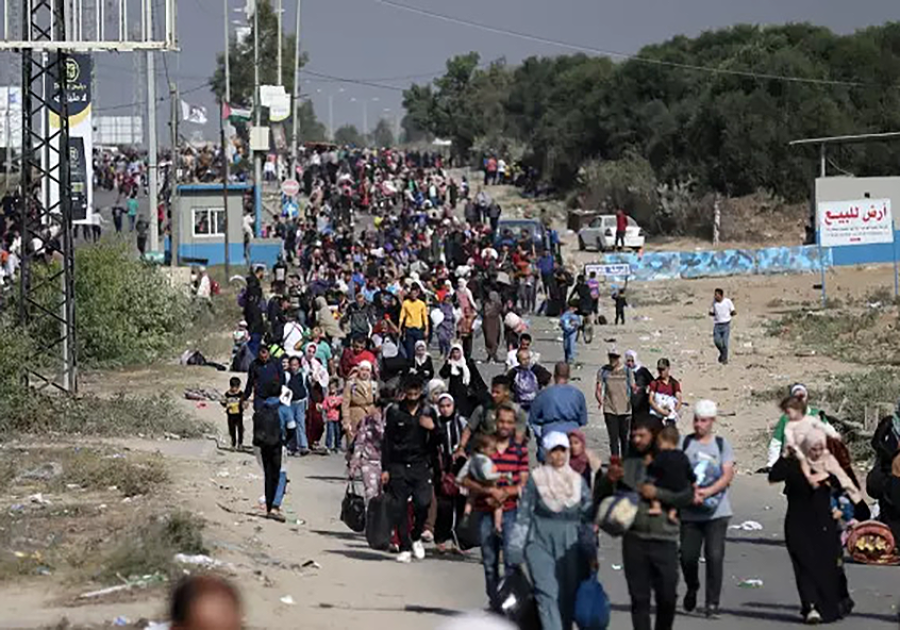Report projects excess deaths due to Gaza crisis
23 February 2024 London School of Hygiene & Tropical Medicine London School of Hygiene & Tropical Medicine https://lshtm.ac.uk/themes/custom/lshtm/images/lshtm-logo-black.png
The analysis was conducted to help better address the humanitarian crisis in Gaza both during and after the war. The war has disrupted health services and resulted in overcrowding, inadequate water, sanitation and hygiene conditions, and insufficient food intake in Gaza. It is important to understand how the conflict is contributing to disease and death there.
The report is a collaborative effort between researchers from the London School of Hygiene & Tropical Medicine (LSHTM) and the Johns Hopkins Center for Humanitarian Health at the Johns Hopkins Bloomberg School of Public Health and is funded by the UK Humanitarian Innovation Hub.
Visit the Gaza projections website for the complete report.
The projections, which are not predictions, cover the period from February 7 to August 6, 2024 (six months). The projections cover three different scenarios: ceasefire; status quo; and escalation. Over the next six months the report estimates that:
With no epidemics occurring, the projection for the ceasefire scenario would be 6,550 excess deaths, for the status quo scenario 58,260 excess deaths, and for the escalation scenario 74,290 excess deaths.
With epidemics occurring, the projection for the ceasefire scenario would be 11,580 excess deaths, for the status quo scenario 66,720 excess deaths, and for the escalation scenario 85,750 excess deaths.
Under the ceasefire scenario the projections suggest that infectious diseases, would be the main cause of excess deaths. Traumatic injuries followed by infectious diseases would be the main causes of excess deaths in both the status quo and escalation scenarios.
Even in the best-case scenario of an immediate ceasefire there would continue to be thousands of excess deaths after a ceasefire was agreed. These would only be mitigated by rapid action to improve the provision of water, sanitation and shelter, and restore functioning healthcare services in Gaza.
The breakdown of water and sanitation, inadequate shelter and insufficient food intake leads to a projected high risk of excess deaths from endemic infectious diseases, particularly respiratory tract infections. If infectious disease epidemics occur, cholera, measles, meningococcal meningitis, and polio are epidemics projected to potentially cause the most excess deaths.
While a ceasefire may reduce trauma-related deaths, our projections show excess deaths due to wounds and complications from traumatic injuries would continue to occur, highlighting the critical importance of providing secure and operational healthcare facilities that can offer trauma care and rehabilitation services.
Even though the total numbers of estimated excess deaths from maternal and neonatal causes are relatively small compared to other health areas, every loss of a mother has severe consequences for family health and wellbeing. It could see progress made in maternal and neonatal survival put back over a decade.
The researchers are undertaking this work as Gaza's health infrastructure is no longer adequately functioning. The impact of the crisis on Israel is better understood and there is not a lack of capacity to respond.
Professor Francesco Checchi of LSHTM, co-leader of the project team, said: “We wanted to develop and share evidence for decision-makers, to show how this crisis could play out in terms of lives.”
Professor Paul Spiegel of the Johns Hopkins Center for Humanitarian Health, co-leader of the project team, said: “Even if a ceasefire were declared tomorrow, thousands more people would likely die as a result of the conflict. Our analysis can help humanitarian organizations, governments, and others plan more effectively and save lives.”
Image: Palestinians fleeing northern Gaza on 9 November 2023 amid Israel's bombardment and siege of the enclave, and intense fighting between the Israeli military and Hamas fighters in the north.
Credit: Mohammed Zaanoun/TNH
LSHTM's short courses provide opportunities to study specialised topics across a broad range of public and global health fields. From AMR to vaccines, travel medicine to clinical trials, and modelling to malaria, refresh your skills and join one of our short courses today.